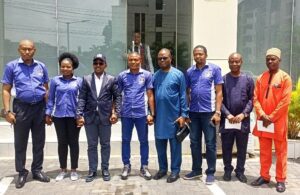Wealth creation: Economic expert calls for scrapping of NNPC, land use act …Lauds CFJ on 2018 bullion lecture
Wealth creation: Economic expert calls for scrapping of NNPC, land use act
.Lauds CFJ on 2018 bullion lecture
By Udeme Clement
The President, Institute for Governance and Economic Transformation, IGET, also the former Deputy Governor, Central Bank of Nigeria ,CBN, Prof. Kingsley Moghalu has called for the scrapping of the Nigerian National Petroleum Corporation ,NNPC, and the Land Use Act, saying they are bane of wealth of creation and economic prosperity.
Moghalu made this known while delivering a lecture on the topic, ‘Overcoming poverty: the secret of the wealth of nations’, at the 2018 Bullion lecture, organised by Centre for Financial Journalism, CFJ, at Civic centre, Lagos.
According to him, “Establishment and consistent application of a clear economic philosophy of entrepreneurial capitalism in the context of a developmental-state, as the guiding framework for the Nigerian economy is imperative for wealth creation. The constitutional repeal of the Land Use Act that traps the wealth of Nigeria’s citizens in the hands choking grip of state bureaucracy must go. Scrapping NNPC and reforming it as a partially privatised company is important. Deregulation of the downstream petroleum sector must be given urgent attention. Government should avoid further foreign borrowing, which has put us back into a debt trap that will weigh down the future generations of Nigeria”.
He went on, “Innovation is needed to create the wealth of a nation, because it stimulates economic growth and development. Innovation creates wealth and paves the way for the economy to create jobs. In this context, intellectual property must be properly priced. But sadly, Nigeria lacks policy on commercialization of innovation. This is a gap we must fill. This means government must look at trade policies that will promote industrial growth, because trade policies are very important in creating the wealth of a nation. For instance, innovative economies create more opportunities for self-employment and the provision of services. Such economies also stay competitive, adapting to the needs of the future rather than, as it is the case with natural resource dependent economies, facing the danger of being left behind by global and market trends, and thus condemning the citizens to poverty”.
He pointed out, “Nigeria as a nation has a national policy on science, technology and innovation but this policy has practically no impact on its economy. This is because, there is no policy support for moving the products of innovation into the marketplace through mass production and marketing distribution, as incentives for innovation are not yet strong enough in intellectual property law and regulation.”
He emphasized, “Nigeria has gotten it wrong in a fundamental manner, as far as its understanding of wealth and poverty of the citizens are concerned. That is why 152million Nigerians are very poor. This is a matter of philosophical emptiness of our political leadership class, the relative absence of sound economic thinking among even our supposedly enlightened class of “Economists” who continue to believe that classic economics with its focus on economic growth statistics, instead of a focus on economic philosophy, organization and development will result in economic transformation. The relegation of intellectual and technocratic competence in economic management in favour of vested interests of our politicians.”
He advised, “The way forward requires that Nigeria’s citizens must now elect a new kind of leadership that offers something radically different by virtue of possessing insight and having the political will to take economic management of Nigeria in a new direction of soundness, quality and results”.
Moghalu commended the management team of CFJ for the timely lecture, saying it was a well thought-out initiative to awaken the consciousness of Nigerians on the need to promote good governance, capable of creating the wealth of Nigerian nation.

 Nigeria suffering from transport poverty – Says Dr Alban Igwe
Nigeria suffering from transport poverty – Says Dr Alban Igwe  Anti-smuggling on waterways : Compt Bamisaiye on the saddle of Western Marine Command
Anti-smuggling on waterways : Compt Bamisaiye on the saddle of Western Marine Command  Border Security : CGC Adeniyi meets NFIU DG, proposes establishment of joint working team
Border Security : CGC Adeniyi meets NFIU DG, proposes establishment of joint working team  Giant strides : Global Transport Policy Annual Roundtable concludes plans to launch new initiative, bilingual magazine
Giant strides : Global Transport Policy Annual Roundtable concludes plans to launch new initiative, bilingual magazine 


